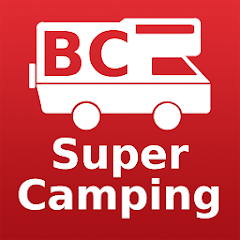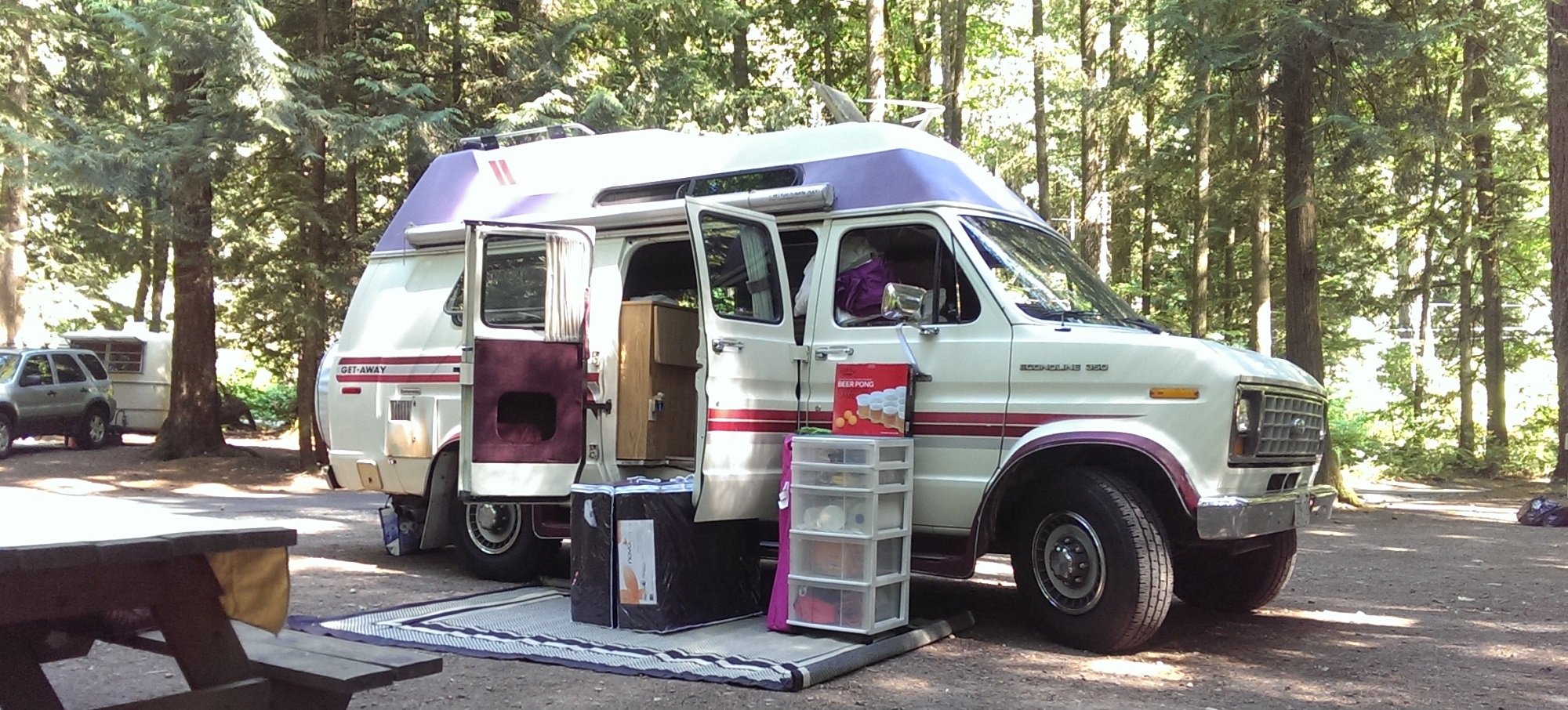Get Away Van at Campsite
Camping and RVing Travel Advice
RV Towing and Size Guidelines
Towing a load that’s too heavy for a vehicle or driving an oversize motorhome/vehicle combo could result in a safety risk to you and others on the roads you’re navigating. Operating an overloaded vehicle is dangerous and illegal and there are regulations to abide by when towing a trailer or vehicle in British Columbia.
Before going anywhere or towing anything, check the vehicle to locate the Gross Vehicle Weight Rating (GVWR); this will be on a sticker and in the manual. People new to RVing often assume that the GVWR is the unit’s actual weight. However, the GVWR is the maximum weight a vehicle or motorhome, with its entire load (passengers, fuel, gear, etc.), is designed to safely carry and/or tow.
The provincial government webpage on recreational vehicles and towing trailers has information on provincial rest areas and resources for safe towing.
Maximum RV Width: The allowed maximum width for an RV is 2.6 m (8 ft 6 in). Mirrors only may exceed the width by 20 cm (8 in) on each side.
Maximum RV Length: The allowed maximum length for an RV is 14 m (45 ft 11 in); 14 m motorhomes must have 3 axles. Maximum length for a towed RV is 12.5 m (41 ft). Maximum overall length for a combination is 20 m (65.6 ft).
Maximum RV Height: The allowed maximum height for any RV vehicle is 4.15 m (13 ft 8 in).
Motorhomes: Motorhomes may tow motor vehicles using a tow bar without brakes hooked up on the towed motor vehicle when the weight of the towed vehicle including its load is less than 2,000 kg (4,409 lbs) and less than 40 per cent of the GVWR of the motorhome towing it. Motor vehicles with a laden weight (therefore including full load) of 2,000 kg and over towed by a motorhome must have brakes and a breakaway device hooked up.
Trailer Weight Calculation: The weight of the trailer is measured when fully loaded; the best way to determine this is to visit a truck weigh scale.
Towing Trailers < 4,600 kg: Recreational trailers weighing less than 4,600 kg can be pulled by the holder of a Class 5 or Class 7 driver’s license. (Most recreational trailers weigh less than 4,600 kg.) An on-highway air brake endorsement is required if either the truck or trailer has air brakes.
Towing Trailers > 4,600 kg: If a driver plans to pull a trailer greater than 4,600 kg and neither the trailer nor truck has air brakes, they will require:
• Class 1, 2 or 3 driver’s licence, or
• Class 4 or 5 driver’s licence with a heavy trailer endorsement (code 20 in BC), or
• Class 4 or 5 driver’s licence with a house trailer endorsement (code 07 in BC).
If you plan to tow a trailer that weighs more than 4,600 kg and either the recreational trailer or your truck has air brakes, you will need a Class 1 driver’s licence with an on-highway air brake endorsement. The Insurance Corporation of British Columbia (ICBC) has detailed info on air brake endorsements.
Trailer Brake Requirements: All trailers and towing dollies over 1,400 kg (3,080 lbs) must be equipped with brakes on all wheels plus a breakaway device hooked to the trailer brake system.
Trailers with a laden weight over 2,800 kg (6,160 lbs) must have brakes and the brakes must be capable of being applied by the driver independently of the towing vehicle’s brake. A surge brake does NOT meet this requirement. A breakaway brake is required. Brakes are required on all axles.
Towing Dolly Brake Requirements: The permitted gross weight of a tow dolly and motor vehicle carried is 1,400 kg (3,080 Ibs) or less. Brakes are not required on the dolly if the net weight of dolly plus the gross weight of motor vehicle carried plus the gross weight of tow vehicle equals less than the gross vehicle weight rating of the towing vehicle. Any other combination requires brakes on the towing dolly.
RV Passenger Rules
All passengers in cars, camper vans or motorhomes are required by law to fasten their seat belts while the vehicle is in motion. The number of passengers inside must not exceed the number of seat belts.
It is illegal for a passenger to ride in a towable trailer or fifth wheel while it is moving on a highway.
Travelling with Propane
RV propane valves must be closed and cylinders must be upright and safely secured while travelling on roads and highways in BC and while on any BC Ferries fleet. The following amounts of propane are permitted on BC Ferries:
RVs
- 2 x 25 kg cylinders (50 litre water capacity for each) connected to a regulator and secured in or on the vehicle
- 1 x 15 kg (30 litre water capacity) for a barbecue
Passenger vehicles
- 1 x 15 kg (30 litre water capacity)
The BC government has a webpage for regulations on travelling with hazardous materials on inland ferries.
Sani-Dump Disposal
Disposing of grey and black water from RV holding tanks should be done responsibly. This can be done at numerous campground and RV parks and at many sani-dump stations around the province; some are free while others charge a modest dumping fee. For a list of RV dump stations and sani-dump stations in British Columbia visit Sanidumps – Canada.
Product Awareness
Travel BC encourages and advises campers to use non-toxic biological products for cleaning and holding tank odour control. Bio products break down naturally in the septic system and aid in the decomposition process and, nowadays, are readily available on the market. Chemical-based RVing cleaning products are harmful to the user and to the environment, including the groundwater and campground and municipal septic systems.
Camping Etiquette
For many, camping is a way to get away from it all – whether it be work, city life or even a change of scenery from one’s neighbourhood – but it’s important that campers are conscious and respectful of other people camping nearby. Here are a few tips on respectable camping etiquette:
- Observe and obey. Upon arrival and while driving around the campground watch for pedestrians and cyclists and park in designated areas only. Keep in mind that many children feel liberated while camping and will often zigzag on bikes and race to playgrounds.
- Be space aware. When setting up camp leave ample room between your tent/RV and the neighbouring campsites and respect others by not cutting through their area.
- Limit your noise. Be considerate of set quiet times at campgrounds and be aware that even during the day radios or music can be a nuisance for those wanting to relax. The same applies to generators – if it’s necessary to use one, aim to do so when it will bother the least number of campers.
- Tidy up. There’s nothing worse than arriving at a campsite to find litter on the ground, in the nearby woods or in the firepit. Tidy as you go, utilize the designated recycling bins that many campgrounds now have, and when you depart the campsite try to leave it cleaner than when you found it.
Take the pledge! Check out the 9 rules in the Campers Code.
For more details on camping etiquette read the article of the same name from the Camping and RVing British Columbia Coalition.
Campfires
Campfire regulations in British Columbia are seasonal and vary from region to region. During the summer months forest fires are a real danger in the province and bans are put in place in dryer areas. For detailed regional information about fire regulations, visit the 9 rules in the Campers Code’s Fire Bans and Restrictions webpage or contact the their information line on 1-888-336-7378. Always check with local BC Visitor Centres or the campground office if you are staying at one as local burning laws supersede those of the Wildfire Service.
- Build sparingly. Construct a campfire for a heat source, to cook and, yes, for the occasional marshmallow roast or sing song but don’t burn for the sake of burning. Firewood should be purchased locally, either from the campsite you’re at or from a nearby grocery store or gas station. If you must gather wood use only dry pieces and branches you find on the ground; don’t burn live timber as it won’t burn and, more importantly, it belongs to the forest and the animals.
- Burn appropriately. Don’t burn garbage in your campfire. The smell is unpleasant, the fumes could be toxic, campsite neighbours won’t appreciate it, it could attract animals to your camp. Unburned waste left in a fire pit is an unappealing discovery for whoever uses the site after you.
- Extinguish properly. Always remain at the campfire and make sure to fully extinguish it when done or going to bed. Embers can remain hot a long time so make sure to pull apart the remaining logs and pour water over the coals.
Visit the Camping and RVing British Columbia Coalition more information on campfire safe practice and how to build a campfire.


